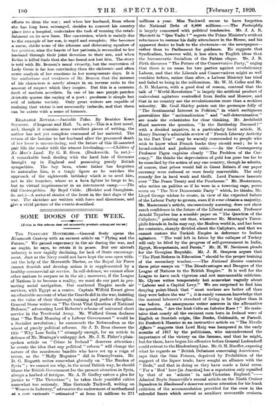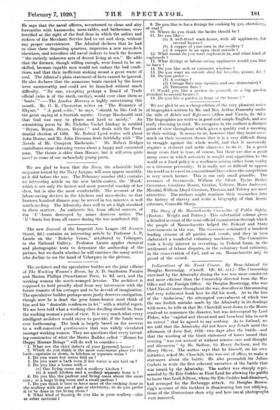SOME BOOKS OF THE WEEK.
Protios is this ohms Joss set istcessarily prods& sitlisssuest sepias.]
THE FEBRUARY MONTRLIMB —General Seely opens the Nineteenth Century with an earnest article on " Flying and the Future." We gained supremacy in the air during the war, and we ought, he says, to _retain it in peace. But our aircraft industry is now rapidly declining, far lack of State encourage- ment. Just as the Navy could not have kept the seas open with- out the help of the Mercantile 'Marine, so the Royal Air Force cannot flourish and develop unless it is supplemented by a healthy commercial air service. In self-defence, we cannot allow other nations to surpass us in the air ; moreover, if the League of Nations is to become a reality, we must do our part in pro- moting aerial navigation. Our scattered Empire needs air services, with Egypt as a centre. Captain -Wilfrid Ewart gives an admirable account of what the'Guards did in the war, insisting on the value of their thorough training and perfect discipline. General Stone writes on "'The Great 'Vital Question of National Defence," advocating Lord Roberts's scheme of universal short service in the Territorial Army. Mr. Watford Green declares that " The Real Meaning of a Labour Government " would be a Socialist revolution ; he .commends the Referendum as the wisest of purely political reforms. Sir J. D. Rees chooses the title " Why Lose India ? " strangely enough, for an article in defence el Mr. Montagu's unhappy Act. Mr..J. R. Yuffier'splain- spoken article on " Crime in Ireland " deserves attention ; he scouts the idea that any political " reform " will change the nature of the murderous bandits who have set up a reign of terror, as the " Molly Maguires " did in Pennsylvania. Mr. I). G. Hogarbh writes somewhat gloomily on " The Burden of Syria " ; we cannot see why, in the usual Paitish way, he should blame the British Government for the present situationin Syria, always a hated of intrigue. Mr. A. D. Godley-enters a plea for justice to " The Victorians-"; he takes their youthful critics somewhat too seriously. Miss Gertrude Tue.:bye/4 writing on " Women in Industry," advocates the endowment of motherhood alt a emit variously " estimated " at from 11 millions to 271 millions a year. Miss Tuckwell seems to have forgotten the National Debt of 8,000 millions.—The Fortnightly is largely concerned with political tendencies. Mr. J. A. R. Marriott in "Quo -Vedic ? " regrets the Prime Minister's evident -reluctance to •resume his deny attendance in the House, and his apparent desire to look to the electorate—or the -newspapers— 'rather than to Parliament for guidance. Be suggests that Syndicalism, however wild, is less alien to English ideas -thee the bureaucratic Socialism of the Fabian clique. Mr. J. B. Firth discusses " The Future of the-Conservative Party," urging that there is no room for two parties against revolutionary Labour, and that the Liberals and Conservatives might as well combine before, rather than after, a Labour Ministry has tried and failed to bring in the millennium. Mr. W. IL Canes and Mr. A. D. 11deLaren, with a good deal of reason, contend that the talk of "World-Revolution " is largely the artificial product of malevolent agitators controlled from Berlin and Moscow, and that in no country are the revolutionaries more than a reckless minority. Mr. Cecil Shirley points out the grotesque folly of " The Sentimental Interest in Polities," in which ambiguous generalities like " nationalization " and "self-determination " are made the substitutes for clear thinking. Mr. Archibald Kurd answers the question, "Is the Battleship Doomed ? " with a decided negative, in a particularly lucid article. M. henry Da.vray's admirable review of " French Literary Activity in the Past Year " may be warmly commended to people who wish •to know what French books they should read ; he is a broad-minded and judicious critic.—In the Contemporary Professor Pigou explains clearly " The Problem of the Cur- rangy." He thinks the depreciation of gold has gone too far to he remedied bythe action of any one oountry, though he admits, of course, that prices would _fall in Great Britain if our paper 'currency -were seduced or -were freely convertible. The only remedy lies in hard work and thrift. Lord Parmoor laments over " The Peace Treaty and the Poorhouse." Mr. Maaterman, who writes on polities as if lie were in a towering sage, pours scorn on " The New Democratic Party " which, he thinks, Mr. Lloyd George wishes to create, in \new of the expected failure of the Labour Party to govern, -even if it-ever.obtaina.ii, majority. Mr. Masterman's article, unconsciously"amusing, does not show much confidence in the future of the Liberal remnant Professor Arnold Tsombee has a sensible paper on " The Question of the Caliphate," pointing out that, whatever Mr. Montagu's Turco- -phile friends in India may say,-the Moslem worldie, and has been for centuries, sharply divided about the Caliphate, and that we .cannot restore the Turkish Empire in deference to Indian agitators. " The void left in Islam by the collapse of Turkey will only be filled by the progress of self-gavernment in India, Egypt, Mesopotamia., and Persia." Mr. II. W. Nevinson pleads for the Georgian Republic. Mr. J. H. Simpson argues that " The First Reform in Education " should be the proper training of the secondary teacher.—The National Review contains -three prize -essays on " The Disadvantages and Dangers of the League of Nations to the British -Empire." It is well for the League to have such vigorous and not unreasonable criticism. Mr. (dynes writes temperately but somewhat .vaguely about "Labour and a Capital Levy." We are surprised to find him denying point-blank that " moat workers are better off than they were before the war " ; it is-slimly common knowledge that the manual labourer's standard of living is far higher than it was before. An anonymous writer answers in the affirmative the question, " Are the Irish Celts an Inferior Race ? " He main- tains that nearly all the eminent men born in Ireland were of English or Scottish origin, like Burke, Goldsmith, or Parnell. Sir Frederick Maurice in an instructive article on " The Nicene Ajjaire " suggests that Lord Haig was hampered in the early months of 1917 by the politicians, who misunderstood the importance of the victory on the Somme, and that he might, but for them, have begun his offensive before General Ludendorff could retreat to the Hindenburg Line. Mr. O. M. Hueffer, exposing what he regards as " British Delusions concerning Americans," says that the Sinn Feiners, deprived by Prohibition of the support of the liquor trade, have sought an alliance with the " Reds," and that in doing so they have made a fatal error. " For a Red' here [in .Arnesiesj has .a reputation only equalled by that of an atheist' in mid-Victorian England."— Admiral Boyle Somerville's second article on the Ninth Cruiser Squadron in Blackwood's deserves serious attention for his frank criticism of the accommodation provided for the crew in the splendid liners which served as auxiliary mercantile cruisers. He says that the naval officers, accustomed to clean and airy forecastles with hammocks, mess-tables, and bathrooms, were horrified at the sight of the foul dens in which the sailors and stokers of the Merchant Service had to eat and sleep, without any proper conveniences. The Admiral declares that he had to close these disgusting quarters, improvise a new mess-deck elsewhere, and introduce old naval stokers to teach the firemen " the entirely unknown arts of decent living at sea." He adds that the firemen, though willing enough, were found to be un- skilled, because capable men would not endure the bad condi- tions, and that their inefficient stoking meant a great waste of coal. The Admiral's plain statement of facts cannot be ignored. He also declares that the numerous boats carried by the liners were unseaworthy and could not be launched without much difficulty. " No one, excepting perhaps a Board of Trade official (who is of the earth, earthy), would ever class them as ' boats.' "—The London Mercury is highly entertaining this month. Mr. G. K. Chesterton writes on " The Romance of Rhyme." " A good critic," he says, " should be like God in the great saying of a Scottish mystic. George Macdonald said that God was easy to please and hard to satisfy." An astonishing poem by Mr. Nicholas Vachel Lindsay is entitled " Bryan, Bryan, Bryan, Bryan ! " and deals with the Presi- dential election of 1896. Mr. Robert Lynd writes well about John Donne, and Mr. John Freeman deals faithfully with " The Novels of Mr. Compton Mackenzie." Mr. Robert Bridges contributes some charming verses about a happy and contented man. The theme is older than Horace, but it will seem quite novel to some of our melancholy young poets.







































 Previous page
Previous page